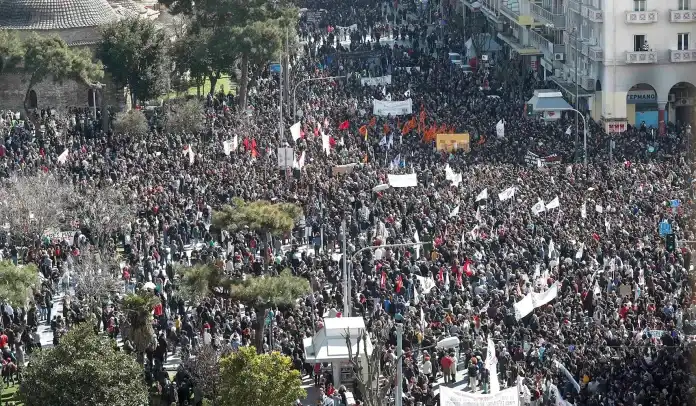Tens of thousands of people demonstrated in Greece on Wednesday in response to the country’s worst train accident on record, while workers began a nationwide day-long walkout.
The event on February 28 claimed 57 lives and infuriated the public over the state of the rail system. Workers on strike contend that years of neglect, inadequate financing, and understaffing are the result of Greece’s ten-year debt crisis.
More least 40,000 people marched through central Athens, chanting “Murderers!” and “We are all in the same carriage,” including professors, students, and representatives of the transportation industry.
While demonstrators clashed with the police, police fired tear gas into the crowd. Thousands of people protested in Thessaloniki, Greece’s second-largest city after some demonstrators threw stones at a government building.
Travel around the country was hampered at the same time as the protests as a result of the 24-hour strike, which was called by workers from various businesses. University students traveling from Athens up north to Thessaloniki were among the 350 people on board an intercity passenger train that collided head-on with a freight train while using the same track. Demonstrations against the catastrophe have been taking place all over Greece for the past week.
A protest scream that has come to be remembered as this was repeated on a sign that read, “Call me when you get there,” in Athens. Because the government took no action to assist any of those kids, “You are furious. 19-year-old Nikomathi Vathi said, “The public transit system is a complete mess.
Another student, Vaggelis Somarakis, added, “We’re going to be here until things change.
We are our country’s future, and we won’t give up,” On Wednesday, the conservative administration, which had initially planned to hold elections soon, promised to make changes to the ailing train system. The transport minister, George Gerapetritis, acknowledged the wrath the incident had caused at a press conference.
He expressed sadness for the bloodiest rail catastrophe in Greek history, saying, “If we haven’t made every effort to assure the highest degree of safety, no train will leave again.
